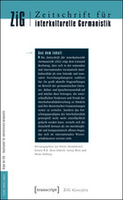
Zeitschrift fur Interkulturelle Germanistik
Scope & Guideline
Navigating the Landscape of Intercultural Communication
Introduction
Aims and Scopes
- Intercultural Literary Studies:
The journal emphasizes the study of literature as a means to understand and navigate intercultural relations, particularly how different cultures interact, influence, and reshape each other through literary narratives. - Cultural Identity and Representation:
A core focus is on the representation of identity in literature, examining how authors construct identities through cultural narratives, often in the context of migration, exile, and post-migrant experiences. - Historical Contextualization:
The journal seeks to contextualize literary works within their historical settings, investigating how historical events shape cultural narratives and literary expressions, particularly in relation to German literature. - Thematic Diversity:
The journal covers a wide range of themes, including migration, memory, and identity politics, contributing to a nuanced understanding of cultural dynamics in contemporary literature. - Methodological Plurality:
Employing diverse methodologies, including literary analysis, cultural studies, and historical critique, the journal encourages interdisciplinary approaches to understanding literature.
Trending and Emerging
- Post-Migrant Literature:
There is a growing emphasis on post-migrant literature, exploring how authors from diverse backgrounds navigate and articulate their identities within the German literary landscape. - Intercultural Appropriation and Resistance:
Emerging discussions on appropriation and resistance highlight how cultural exchanges can lead to both enrichment and conflict, reflecting the complexities of intercultural interactions. - Mediterranean Studies:
An increasing focus on Mediterranean cultural dynamics and their influence on German literature is notable, indicating a trend towards exploring cross-cultural connections and historical narratives. - Environmental and Postcolonial Perspectives:
Recent publications are integrating environmental themes and postcolonial critiques, examining how literature reflects and responds to global issues of race, gender, and ecological concerns. - Digital and Media Culture:
The impact of digital media on literature and cultural representations is emerging as a relevant topic, as scholars investigate how new forms of storytelling and communication shape intercultural dialogues.
Declining or Waning
- Traditional Literary Criticism:
There appears to be a decline in traditional literary criticism that does not engage with intercultural contexts, reflecting a shift towards more contemporary and relevant forms of analysis. - Eurocentric Perspectives:
The focus on purely Eurocentric literary themes is waning, as the journal increasingly embraces global perspectives and the complexities of transnational narratives. - Static Cultural Models:
The use of static cultural models to analyze literature is less prevalent, indicating a movement towards more dynamic and fluid understandings of culture and identity. - Historical Exclusivity:
Themes that exclusively center on historical literary figures without connecting them to current intercultural dialogues are becoming less frequent, suggesting a preference for relevance in contemporary discussions. - Narrow Genre Studies:
There is a noticeable decrease in papers focused solely on niche genres without intercultural implications, as the journal expands its scope to include broader thematic explorations.
Similar Journals

Cultura Lenguaje y Representacion-Revista de Estudios Culturales de la Universitat Jaume I
Illuminating the Ties Between Language and RepresentationCultura Lenguaje y Representacion - Revista de Estudios Culturales de la Universitat Jaume I is a premier open-access journal dedicated to the exploration of cultural studies, linguistic discourse, and literary theory, published by the esteemed Universitat Jaume I. Since its inception in 2004, the journal has consistently aimed to provide a vibrant platform for interdisciplinary research and critical reflection within the fields of communication, literature, and cultural representation. With its impressive rankings in the Scopus database—placing in the 93rd percentile for Literature and Literary Theory and the 73rd percentile for Cultural Studies—this journal is recognized for its impactful contributions to academic discussions. Operated out of Castelló de la Plana, Spain, the publication not only welcomes contributions from seasoned scholars but also encourages emerging researchers to submit innovative works. By maintaining a dedication to accessibility and quality, Cultura Lenguaje y Representacion positions itself as an essential resource for scholars, practitioners, and students seeking to deepen their understanding of the intricate relationship between culture, language, and representation.
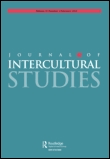
Journal of Intercultural Studies
Navigating the Rich Tapestry of Global CulturesWelcome to the Journal of Intercultural Studies, a premier publication in the fields of Cultural Studies, History, Sociology, and Political Science, brought to you by Routledge Journals, Taylor & Francis Ltd. With an impressive Q1 ranking in both Cultural Studies and History, as well as a solid performance in Sociology and Political Science, this journal stands as a vital resource for researchers, academics, and students seeking to explore the complexities of intercultural engagement and historical narratives from 1980 to 2024. Indexed in Scopus with high percentiles, the journal not only contributes to scholarly discourse but also facilitates access to a diverse range of interdisciplinary insights. While it currently does not offer open access, its comprehensive studies and authoritative articles are indispensable for those committed to understanding the nuances of cultural interactions and their societal implications.
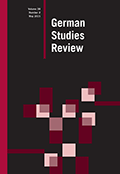
GERMAN STUDIES REVIEW
Advancing Interdisciplinary Insights into German StudiesGERMAN STUDIES REVIEW, published by Johns Hopkins University Press, is a premier academic journal dedicated to the interdisciplinary study of German culture and society, merging literary, historical, and cultural studies. With a commitment to advancing scholarship since its inception in 1982, this journal serves as an essential platform for researchers, professionals, and students interested in Germanic studies, boasting an ISSN of 0149-7952 and an E-ISSN of 2164-8646. While it is presently classified in the Q4 quartile of both the Arts and Humanities (miscellaneous) and Cultural Studies categories by Scopus, its wide-ranging scope includes not just traditional literary analysis, but also contemporary cultural phenomena, making it relevant to various fields. Although the journal is not open access, its contributions are vital for fostering critical dialogue and scholarly research that explores the complexities of German culture in a global context. The GERMAN STUDIES REVIEW is an invaluable resource for anyone eager to deepen their understanding of German studies and engage with cutting-edge academic discussions.
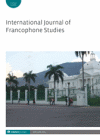
INTERNATIONAL JOURNAL OF FRANCOPHONE STUDIES
Navigating the Intersections of Culture and SocietyThe INTERNATIONAL JOURNAL OF FRANCOPHONE STUDIES, published by INTELLECT LTD, serves as a significant platform for exploring the multifaceted dimensions of Francophone culture and its impact across various disciplines. With an ISSN of 1368-2679 and E-ISSN 1758-9142, this journal supports a diverse scholarly discourse in areas such as Cultural Studies, Gender Studies, History, Linguistics, Literature, and Sociology, among others. As of 2023, it is categorized in Q4 for multiple fields and Q3 for Literature and Literary Theory, underscoring its evolving academic presence. Researchers, professionals, and students can benefit from its rich repository of critical analyses and innovative perspectives that foster an understanding of the Francophone world from a global viewpoint. Although it does not offer open access options, its rigorous peer-review process ensures high-quality contributions that are essential for anyone engaged in Francophone studies. Situated in the United Kingdom, the journal has forged an academic legacy since its inception and continues to be a vital resource for those studying the intersections of language, culture, and identity.
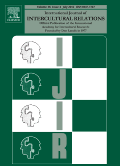
International Journal of Intercultural Relations
Empowering Voices in Intercultural StudiesWelcome to the International Journal of Intercultural Relations, a premier publication dedicated to advancing the field of intercultural studies. Published by Pergamon-Elsevier Science Ltd in the United Kingdom, this journal has established itself as a vital resource for researchers and practitioners focusing on the complexities of cultural interactions across the globe. With an impressive impact factor reflecting its significance—ranked in Q1 for Business and International Management and Sociology and Political Science, and Q2 for Social Psychology—this journal strives to deliver cutting-edge research that informs and influences policy and practice in a multicultural world. Since its inception in 1977, the journal has provided a platform for interdisciplinary discourse and empirical studies, ensuring that the voices of diverse cultures are heard and understood. Researchers, professionals, and students engaged in intercultural relations will find valuable insights and methodologies that tackle contemporary challenges in this vital area of study. Join us as we explore the nuances of human interaction within a globalized society.

Italica Belgradensia
Connecting Scholars Across Borders in Philology.Italica Belgradensia is a distinguished academic journal published by the University of Belgrade, Faculty of Philology, dedicated to advancing research in the fields of linguistics, literature, and cultural studies. With an ISSN of 0353-4766 and an E-ISSN of 2812-877X, this journal serves as a critical platform for scholars, professionals, and students to explore contemporary issues and trends in the philological disciplines. Although it currently does not offer open access, Italica Belgradensia maintains a rigorous peer-review process, ensuring high-quality and impactful scholarship. The journal is committed to fostering interdisciplinary dialogue and encourages submissions that reflect innovative methodologies and theoretical approaches. With its strategic location in Belgrade, the journal aims to bridge Eastern and Western academic traditions, enriching the global discourse in philology.

YALE FRENCH STUDIES
Fostering Connections Between Culture, History, and LiteratureYale French Studies is a prominent academic journal published by Yale University Press in the United States, dedicated to advancing the discourse on Francophone literature, culture, and thought. With an ISSN of 0044-0078, this journal serves as a vital platform for interdisciplinary scholarship, encompassing areas such as cultural studies, history, and sociology. Although it operates under a traditional subscription model, its contributions are significant, particularly between the converged years spanning 2002 to 2014, 2018 to 2019, and 2021 to 2023. The journal currently holds Q4 rankings in various categories, including cultural studies and visual arts, and offers rich, scholarly insights that are crucial for researchers, professionals, and students alike. As an esteemed publication in the realm of literature and literary theory, Yale French Studies is instrumental in fostering a deeper understanding of French cultural contexts and their global implications, marking it as an essential resource for anyone engaged in Francophone studies.

NEW GERMAN CRITIQUE
Exploring the Frontiers of German Studies and Cultural TheoryNEW GERMAN CRITIQUE is a prominent academic journal published by Duke University Press, focusing on the dynamic intersections of German studies, cultural theory, and social thought. With its ISSN 0094-033X and E-ISSN 1558-1462, this journal facilitates a critical dialogue within the Arts and Humanities and Cultural Studies fields. As a Q3-ranked journal in both categories as of 2023, it represents a significant platform for scholars exploring contemporary issues through a German lens, addressing themes of identity, memory, and cultural politics. Although NEW GERMAN CRITIQUE is not an open-access journal, it remains a crucial resource for researchers, professionals, and students interested in the evolving landscape of cultural studies, inviting contributions that foster innovative perspectives and facilitate intellectual exchange. Founded in 1988 and continuing its vital discourse into 2024, the journal is headquartered in Durham, North Carolina, and serves as a touchstone for those engaged in the complexities of modern German culture and its global implications.

REVISTA DE FILOLOGIA DE LA UNIVERSIDAD DE LA LAGUNA
Advancing linguistic insights from the heart of the Canary Islands.REVISTA DE FILOLOGIA DE LA UNIVERSIDAD DE LA LAGUNA is a prestigious academic journal dedicated to advancing the fields of linguistics and language studies. Published by the Universidad de la Laguna in Spain, this journal serves as an essential resource for researchers, professionals, and students alike, offering critical insights and scholarly articles that contribute to the understanding of language and its intricacies. With its inclusion in the Q3 category of the 2023 Linguistics and Language rankings and Scopus rankings, it demonstrates a growing impact within the academic community, while maintaining a commitment to fostering dialogue and disseminating valuable research. As a platform for innovative ideas and diverse perspectives, the journal aims to bridge theoretical approaches and practical applications, ensuring that readers are well-equipped to engage with contemporary issues in linguistics. Although it is currently not open access, the journal remains an influential contributor to the language and linguistics sectors, operating from the picturesque Canary Islands, enhancing its appeal not only as a scholarly resource but also as a culturally rich platform for academic expression.

Baltic Journal of English Language Literature and Culture
Exploring the Intersection of Language, Literature, and CultureBaltic Journal of English Language Literature and Culture is a prominent platform for scholarly discourse in the fields of English language, literature, and cultural studies, published by University of Latvia Press since its inception. With an ISSN of 1691-9971 and an e-ISSN of 2501-0395, the journal has established itself as an Open Access resource since 2018, making it accessible to a global audience of researchers, academicians, and students. Located in Riga, Latvia, this journal endeavors to bridge gaps in the understanding of linguistic and literary developments, particularly in the Baltic region. Although it faces competitive ranking in the Scopus database, underscored by its current rankings of #1055 in Literature and Literary Theory and #1063 in Language and Linguistics, the journal continues to attract contributions that reflect innovative research and inquiry. Through its open-access model, Baltic Journal of English Language Literature and Culture is dedicated to fostering a diverse range of perspectives and nurturing dialogue that enriches the understanding of the English language’s intersection with culture and literature.